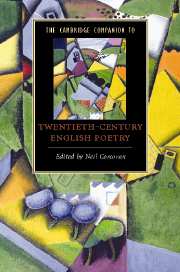9 - Languages of modernism: William Empson, Dylan Thomas, W. S. Graham
from Part III - Modernists
Published online by Cambridge University Press: 28 January 2008
Summary
If one wishes to understand the attitude to their craft of British poets of the mid-twentieth century, the influence of T. S. Eliot, both in his poetry and his criticism, is one of the most important facts to consider. This is true even where that influence is mediated or qualified, but in the case of William Empson it is direct and avowed. Empson's Seven Types of Ambiguity (1930) and The Structure of Complex Words (1951) are developments of Eliot's shift away from 'personality' and 'emotion' towards the discovery of feelings of which the identifiable components of the poem were the only true gauge. A more proximate influence on Empson's thinking was his Cambridge tutor, I.A. Richards, but Eliot lies behind Richards too and is a more pervasive point of reference for poets.
The revolution that Eliot wrought in the reading and criticism of poetry can best be illustrated by a compilation of assertions from the essays collected in The Sacred Wood. In the best-known of these, 'Tradition and the Individual Talent' (1919) , he states that 'The poet's mind is . . . a receptacle for seizing and storing up numberless feelings, phrases, images, which remain there until all the particles which can unite to form a new compound are present together.' The word 'compound', in evoking a scientific analogy, suggests that 'impersonality' which Eliot lauds in the essay, and this consorts well with another implication: the poem becomes an object - a variegated object, compounded of different elements, but an object nevertheless.
- Type
- Chapter
- Information
- The Cambridge Companion to Twentieth-Century English Poetry , pp. 131 - 144Publisher: Cambridge University PressPrint publication year: 2007



